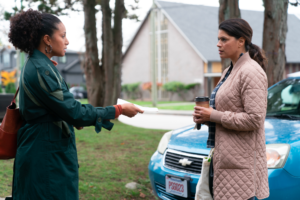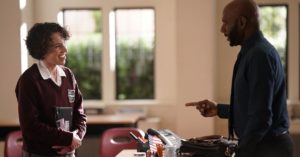Rejecting “The Prom”-posal - Movie Review
Despite everything it was capable of, all of these poor choices strung together amount to nothing more than a counter-productive film.
Incluvie Foundation Gala - Learn More
This is definitely not the first time I’ve raved about ABC’s A Million Little Things. The ensemble drama has knocked it out of the park season after season with gripping stories surrounding a group of friends living in Boston. The hour-long episodes air weekly, which is a refreshing callback to a simpler time in television; when a narrative had to generate enough suspense to motivate a cliffhanger worthy of keeping an audience member’s attention for seven entire days until the next episode aired. Though, once you get started with this series, it will surely be something you want to binge.
This cast is so excellently and effortlessly diverse and has succeeded in covering a multitude of issues that give each character tremendous layers. Inclusion of such topics as mental health, addiction, sexual assault, and Black Lives Matter (the list goes on and on) in no way feels exploitative, but genuinely fuels an audience’s appreciation of matters they may not have the lived experience to understand.
Writers such as Kristina Woo, who have been featured on Incluvie’s Podcast, aid in telling these textured stories by utilizing the talents of its diverse cast. In this season supporting characters have been welcomed into the folds of the story and so far, they have added an immeasurable depth. Here are some of my favorite additions to A Million Little Things this year:
Esposito has a background in comedy, perhaps the most fun being the ‘Ask a Lesbian’ series she hosted with BuzzFeed. Perhaps my favourite is the hour-long standup she released in which all download profits benefit RAINN, the United States’ largest anti-sexual violence organization. Now that we’ve established that here at Incluvie, we stan Cameron Esposito, allow me to delve into the many reasons I pray each night that this show doesn’t write her off and allow her to see the same fate as season 2/3 favourite, Darcy Cooper (ex-lover of Gary Mendez played by Floriana Lima).
Greta acts as Katherine’s (Grace Park) first serious female love interest after she explores her sexuality post-divorce. Greta is dynamic, supportive of Katherine’s coming-out journey and once she’s introduced to Katherine’s son Theo, is a kind, caring figure. Her character’s struggle with bipolar disorder is handled so tastefully, with a recent episode exploring what explaining the illness to family, friends and children can look like. Esposito’s comedic timing is incredible as she delivers some fantastic one-liners and pumps enthusiasm and energy into every scene she shares with Park, whose character is a little more reserved and logical. Greta brings out a side of Katherine we didn’t get to see when she was married to now ex-husband, Eddie (David Giuntoli). It is so wonderful to see her happily thriving after a tumultuous marriage. They are such a great on-screen pair and though their relationship is on the rocks at this point in the season, I hope to see much more of them together.

You might recognize Andrea Navedo as everyone’s favourite mom from Jane the Virgin. In this series, she plays a mom as well, but unfortunately, one that is more absent. A reconnection with her daughter is part of her growing arc, but her story began when she befriended Regina (Christina Moses) and they started to build their culinary careers together. Val has spent some time in prison and is striving to regain a sense of normalcy in her life. This emotionally charged dynamic has led to some tension between her and Regina over the course of their friendship, but this argument was no match for some compassion and dedicated communication written into these strong female players. Val is emblematic of perseverance, kindness and strength and though we’re not always a fan of a person of colour playing an ex-con, this aspect of her character shrinks into the background as the narrative shifts to focusing on her new business endeavours with Regina and rekindling a bond with her estranged daughter.

Shanice made her first appearance in season 3, where she was introduced to Katherine and incited her pursuit of self-discovery in sexuality. Shanice, as an actress and public figure, disclosed that she has kept her interest in women private so as not to solicit unwanted attention from the press. She shares a romantic moment with Katherine that starts her on her journey and then leaves the show for a while. When we see her again in the later episodes of season 4, the spark between her and Katherine is still there and that causes some waves in her relationship with Greta. This arc between the three highlights the different stages they’re each approaching in their lives as queer women. It normalizes that every individual is influenced by different circumstances when it comes to accepting their sexuality, and that timeline looks different for everyone. What is special about these women is that their relationships with one another is supportive and understanding, and we always love to see women uplifting other women in mainstream media. Katherine’s frankness during her final moments with Shanice give her the courage to come out publicly after years of secrecy.

Ash Spencer is a transgender, non-binary actor that has recently been added to the cast, playing one of Rome Howard’s (Romany Malco) students. Maddox still performs his female identity at school, and only reveals that he prefers to go by Maddox to Rome through a video assignment. After this positive experience, he decides that he’s ready to be his true self at school, stops going by his deadname (Madison), and wears the boy’s uniform. After a smooth day at school, Maddox shows up engaging in social masking and presenting as female the next day, to Rome’s surprise. In a heartbreaking moment, when Rome asks what happened, Maddox simply and sadly states: “I went home.” Maddox asks Rome to speak to his parents. He obliges and the conversation seems to go well (a scene I very strongly encourage readers and LGBTQIA+ allies to watch!) – until the wealthy parents and school donors threaten to pull their funding unless Rome is fired, threatened by his support of their son.
What is interesting about Rome’s connection to Maddox’s parents is that his father was someone who played racist practical jokes on Rome when they were students at the very same school. Rome accepting a teaching position there was part of his journey in healing from that trauma. The river runs deep in his connection to the wealthy white families that dominate this private school system. Rome, knowing what it’s like to feel ostracized in this environment, feels extremely protective of this young student struggling the same way he did. As the season finale approaches, audiences will have to wait and see how this situation resolves itself.

The excellent character work on A Million Little Things allows the series to address issues of race, sexuality and violence in a way that accentuates sensitivity and empathy. Without preaching to its audience, diversity is incorporated in a way that only aids in a well-rounded conveying of these stories through different lenses. The show’s success is a testament to what audiences are craving: authentic stories that broaden the mind and heart.

Related lists created by the same author
Despite everything it was capable of, all of these poor choices strung together amount to nothing more than a counter-productive film.
Related diversity category
Related movie/TV/List/Topic
That gut-wrenching feeling you have while watching it is okay but needed, and you, the viewer, will be okay.